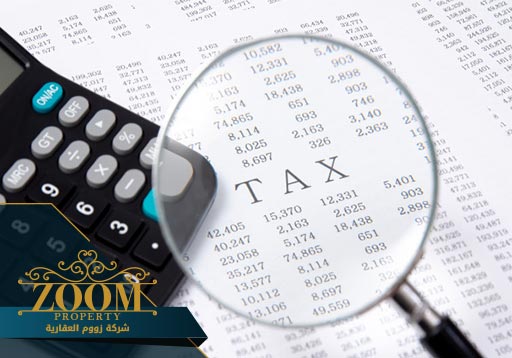
One of the common questions that is asked is: “How much is the real estate tax rate in Turkey?” Answering this question is key to understanding the tax liabilities related to real estate in Turkey.
In this article, we will explore important information about the real estate tax rate in Turkey and the factors affecting its determination and we'll take a look at the different types of property taxes and how they are calculated based on the value and use of the property and we will also go over some of the tax exemptions and facilities available in Turkey.
What is meant by real estate tax in Turkey?
The Turkish state applies a set of taxes on real estate in Turkey, whether it is sale, purchase, gift, donation or inheritance and real estate taxes in Turkey vary into several types, some of which require payment at the time of purchase and others at the time of sale.
A glimpse of property transfer fees in Turkey:
Tabu fees are also known as real estate ownership transfer taxes, and they are the fees that are compulsorily imposed when the ownership of a property is transferred from one person to another in Turkey and turkish laws stipulate that the real estate ownership transfer fee is 4% of the declared value of the property specified in the tapu deed
The buyer and seller must share the payment of this tax equally, however, the common process is for the buyer to bear the full amount, for example if the value of the property is $100,000, then the transfer fee will be $4,000.
It is important to note that sometimes, certain municipalities declare that buyers are exempted from the title deed fees in the area they administer and this is done with the aim of reconstructing the area and real estate development and this movement can be clearly seen in the Kağıthane and Kagıtıköy municipalities of Istanbul.
Some Turkish construction companies also offer incentive offers for the purchase of real estate within the complexes that they build, and sometimes buyers are exempted from real estate ownership transfer fees, which means that the construction company (the seller) will bear the costs of paying the full ownership transfer fees for the real estate that its clients buy.
What are the fees for attesting the purchase of real estate in Turkey?
When signing a contract for the purchase of real estate in Turkey between the seller and the buyer, whether the property is ready for delivery or is still under construction, the two parties must go to the nearest department of the Turkish Notary (Notary Public) to certify the two copies of the contract as being original, and this procedure gives the contract a legal character, and either or both parties can hold the other accountable before the Turkish judiciary in the event of non-compliance with any clause in the contract, especially in the event that the delivery of the property is delayed beyond the date specified in the contract.
The value of the certification fee for the real estate purchase contract in Turkey is 1% of the value of the property.
Information about value added tax in Turkey:
Value Added Tax in Turkey, also known as KDV, is imposed on all products sold in the country, including commercial, industrial and self-employment activities, and in addition to imported goods, services and Turkish real estate, the value-added tax rate is set at 18% for commercial real estate, as for residential real estate, the VAT rate changes according to the area of the real estate, regardless of its location.
If the area of the property does not exceed 150 square meters, the value-added tax rate is 1%, as for real estate with an area of more than 150 square meters, each square meter increase in area increases the tax value by 18%.

What are the conditions for exempting foreigners from value-added tax in Turkey?
- That the foreign investor is not residing in Turkey and does not own any headquarters in the country, whether it is a company, shop, factory, or others.
- Not having resided in Turkey for a period of more than 6 months in the year preceding the purchase of the property, and not having a valid residence permit from the previous year.
- The absence of a registered address in Türkiye in the name of the foreign investor.
- The tax exemption includes new real estate only, including residential buildings such as apartments and villas, as well as offices and workplaces. As for lands and agricultural lands, they are not covered by this exemption.
- A bank transfer proving that the money paid is from external sources or a customs declaration document must be submitted if the amount is transferred in cash to Turkey, and the payment for real estate investment must be in foreign currency.
- It is prohibited to sell properties that are exempted from value-added tax for a full year.
- An application must be submitted to the relevant authorities to benefit from the tax exemption, and care must be taken not to make any mistake that leads to the loss of the right to this exemption.
A glimpse into the real estate gains tax:
Real estate gain tax is a type of tax imposed on real estate that is sold in a period not exceeding 5 years from the date of purchase and this tax is imposed because a property that is sold within a period of less than 5 years is considered an investment and therefore is taxed on real estate gains, and article No. 80 of the Income Tax Law in Turkey provides for this tax, and it is determined based on the difference between the price of the property when buying and its price when selling, in order to calculate the profits made by the person selling the property.
Common questions:
What is the real estate tax rate in Turkey?
The tax rate varies according to the type of property and its use, as for example, the value-added tax (VAT) rate for commercial properties is 18%, while the value-added tax rate for residential properties varies according to the size of the property.
Is the tax rate different between new and old properties?
Yes, the tax rate varies and new properties may be exempt from VAT, while old properties may be subject to this tax.
Does the location of the property affect the tax rate?
No, the tax rate does not depend on the location of the property, but rather depends on the type, area and use of the property.
Related articles
Cheap apartments for sale in Turkey 2022.
Real estate options abound in the real estate market in Turkey.
Real estate investment in Turkey is a golden opportunity.
Conditions for obtaining Turkish citizenship.
Real estate in Turkey has an authentic history and a prosperous future.
The latest developments in order to obtain real estate residence in Turkey.
Prices of apartments in Turkey and the latest developments on them.
How is the strength of the Turkish passport measured?
#Turkey_apartments #real estate_investment #Zoom_prorperty
#Turkish_citizenship #buy_real estate #Istanbul_real estate



